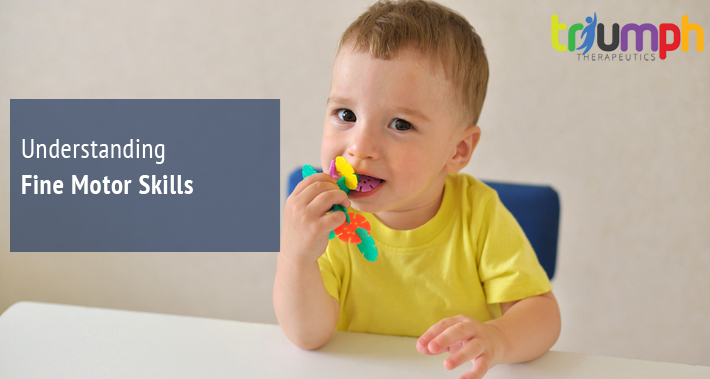Understanding Fine Motor Skills
https://www.triumphtherapeutics.com/wp-content/uploads/2022/04/Triumph-Therapeutics-Speech-Therapy-OT-Physcial-Therapist-Washington-DC-Apr02-01-2022.jpg 710 379 Triumph Therapeutics Triumph Therapeutics https://www.triumphtherapeutics.com/wp-content/uploads/2022/04/Triumph-Therapeutics-Speech-Therapy-OT-Physcial-Therapist-Washington-DC-Apr02-01-2022.jpgFine motor skills play an important role in a high number of our everyday activities.
For example, we need fine motor skills for a variety of everyday tasks, such as getting dressed or turning a doorknob.
If your child is experiencing difficulties with their fine motor skills, everyday tasks such as these may become more difficult.
In this article, we will learn about fine motor skills and how pediatric occupational therapy can help with them.
We will also look at how speech therapy for kids at Triumph Therapeutics can incorporate the development of fine motor skill into treatment.
What Are Fine Motor Skills?
Fine motor skills refer to the set of skills needed to make small, or “fine” movements that involve the muscles in your hands, legs, and face.
Examples of activities that involve fine motor movements include:
- Brushing your teeth
- Turning a doorknob
- Zipping up a jacket
- Fastening a seatbelt
- Writing
Fine motor skills are related to and work with your gross motor skills, the set of skills that allow you to make bigger movements, such as jumping or running.
If your child is struggling with their fine motor skills, you may notice that they struggle with tasks such as:
- Grasping utensils
- Moving objects with their fingertips
- Using tools, such as scissors or rulers
- Tying their shoes
How Do Fine Motor Skills Develop?
Fine motor skills do not develop at the same rate in all children.
Each child is unique and will develop their fine motor skills on their own timelines.
Thus, delays in fine motor skills aren’t automatically a cause for concern.
Problems with fine motor skills are typically diagnosed when the skills develop much slower than usual or with little progress.
Milestones In Fine Motor Skills Development
The following is a general guideline for the fine motor skill milestones that your child should reaching, according to age:
By 4 Months
By 4 months, your child should be able to use their fine motor skills to:
- Open and close their fists
- Bring fingers to their mouth
- Attempt to grab dangling toys
By 6 Months
By 6 months, your child should be able to use their fine motor skills to:
- Reach for objects
- Move objects from one hand to the other
By 9 Months
By 9 months, your child should be able to use their fine motor skills to:
- Pick up light objects with 3 fingers
- Clasp their hands
By 1 Year
By 1 year, your child should be able to use their fine motor skills to:
- Drop objects in cups
- Bang objects together
- Use thumb and fingers to pick up objects
By 18 Months To 2 Years
By 18 months to 2 years, your child should be able to use their fine motor skills to:
- Stack toys
- Put toys in a row
Activities To Build Fine Motor Skills
Home activities are a fun way to help your child develop their fine motor skills.
Examples of home activities that help the development of fine motor skills include:
- Squeezing, rolling, or making objects out of play putty
- Finger painting, or painting with a paintbrush
- Using a sponge to transfer water from one bowl to another
- Racing to see who can pick up more grains of rice with a pair of tweezers
- Using a medicine syringe to fill a cup with water
- Gardening and planting, transferring seeds into small holes
Conditions Associated With Fine Motor Skills Delays
If your child is struggling with their fine motor skills, it is important to get them evaluated by a pediatrician.
There are several known conditions that are associated with fine motor skills delay, including the following:
1. ADD/ADHD
ADD, now known as ADHD, is a mental health condition associated with unusually high levels of hyperactivity and impulsivity.
Children with ADHD commonly experience difficulties with the fine motor skills required to complete certain tasks.
If your child has ADHD, they may exhibit poor hand writing due to challenges with their fine motor skills.
2. Learning Disabilities
Learning disabilities refer to any of several different problems that affect the ability to learn.
The symptoms of learning disability can therefore range.
Children with certain learning difficulties, such as writing disabilities, have trouble with hand eye coordination due to under development of their fine motor skills.
3. Dyspraxia
Dyspraxia is a disorder which causes problems with movement, coordination, judgment, processing, memory, and other cognitive skills.
Some symptoms of dyspraxia are associated with fine motor difficulties, including poor balance, clumsiness, and poor hand eye coordination.
If your child is struggle with dyspraxia, you may notice that they have trouble with planning and completing fine motor tasks.
4. Down Syndrome
Down syndrome is a developmental disorder that results from having an extra chromosome.
Children with Down syndrome often struggle with low tone and hypermobility in their hands, wrists, and elbows.
This results in fine motor difficulties.
Other Causes Of Fine Motor Skills Delay
There are many other conditions associated with fine motor skills day, such as:
- Autism spectrum disorder
- Premature birth
- Physical, cognitive, or developmental disorders or conditions
Additionally, some children may experience difficulties with their fine motor skills for no discernable reason – this is called an idiopathic fine motor skills delay.
In these cases, fine motor skills typically improve with occupational therapy.
How Can An Occupational Therapist Help?
Occupational therapy can provide solutions for fine motor skills delay in order to help your child become as independent as possible in daily life.
Your child’s occupational therapist will use child appropriate therapies, such as play based therapies, to help develop your child’s cognitive, physical, and fine motor skills.
Some of the fine motor skills that can improve with occupational therapy include:
- Handwriting
- Self care skills
- Visual motor integration
- Visual perception skills
- Social and peer interaction skills
- Feeding
- Self regulation skills
- Sensory processing
- Strength and coordination
- Motor planning
How Can Speech Therapy Help
Occasionally, articulation disorders and fine motor skills delay go hand in hand.
If your child is struggling with both their speech and fine motor skills, a speech therapist can incorporate activities that encourage the development of fine motor skills into treatment.
Your child’s speech therapist may use tools, such as LEGOs, to encourage proper speech.
For instance, a speech therapist may get your child to connect together a certain amount of LEGOs to represent the number of syllables in a given word.
Book Your Appointment With Triumph Therapeutics Today
Is your child struggling with fine motor skill delay?
There is help.
At Triumph Therapeutics, we want to help you and your child overcome fine motor difficulties.
Book your appointment with Triumph Therapeutics today.


